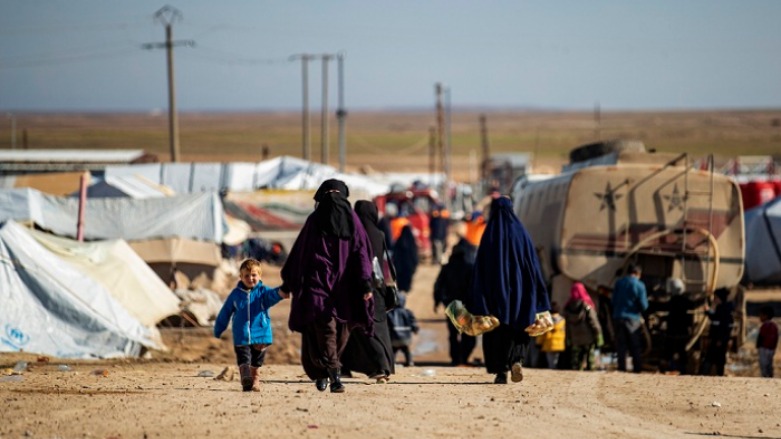Return of Iraqi families from Syria’s al-Hol camp delayed: Source
“There was a desire to bring back 500 families per repatriation trip, but there was a lack of capacity in terms of logistical support and the allocated camp is not ready for such numbers.”

ERBIL (Kurdistan 24) – The repatriation of 100 Iraqi families from the notorious al-Hol camp in Syria has been postponed indefinitely, a humanitarian source told Kurdistan 24. The families were due to arrive on Wednesday.
The source noted that the al-Jada camp in Nineveh province is not ready to provide necessary services and the families’ arrival. Non-governmental organizations (NGOs) were planning to help with the repatriation process.
In 2019, 1,700 Iraqi families at al-Hol registered with the United Nations for future voluntary repatriation. Apparent opposition from local Iraqi governments delayed the process, however.
Last Tuesday, a Pentagon Inspector General report covering the first quarter of 2021 (Jan 1–March 31, 2021) said that “many Iraqis in Syrian displacement camps are unable to return home because the Iraqi government does not permit their return, even though many have registered to do so.”
The report added that the US and international NGOs continued to encourage the Iraqi government to develop an effective mechanism to facilitate their return.
Last week Luqman Ahmi, spokesperson for the local Autonomous Administration of North and East Syria (AANES), told Kurdistan 24 that Iraqi authorities had agreed for 500 families to be “repatriated back to their country in multiple phases.”
The majority of al-Hol’s over 60,000 residents are Iraqis (approximately 31,000) and Syrians, but the camp also includes a large number of foreign residents thought to be tied to ISIS.
“There was a desire to bring back 500 families per repatriation trip, but there was a lack of capacity in terms of logistical support and the allocated camp is not ready for such numbers,” the humanitarian source told Kurdistan 24.
According to the delayed plan, the goal was to first return 100 families, around 600 to 700 individuals, to the al-Jada camp.
“The Iraqi government will provide transportation busses, but the discussion is still ongoing if trucks will take back personal belongings also,” the source said.
They also explained that there is now a strong desire among Iraqis at al-Hol to return to Iraq, according to a new assessment, a shift from last year’s when the majority of Iraqis at the camp opposed repatriation.
“This is an indication of how critical the security situation is in the camp. The process will be voluntary and done after an assessment by NGOs if the families want to return or not.”
Tribal Issues
The families will likely not be able to return to their homes once in Iraq, due to opposition from people in Mosul. They will instead have to live in a camp for internally displaced people.
“Many families have tribal problems and need negotiation with their tribes. It’s not due to security issues such as links to ISIS, but due to tribal issues.”
Another issue for the repatriation is the legal documentation of Iraqis in the camp.
According to a UNCHR report from two years ago only “an estimated 30 percent of the total Iraqi population of 30,706 is in possession of valid documentation” in al-Hol. “And of those, only half has a copy. The situation is even worse for Iraqi children.”
Civil Documentation
An Iraqi NGO, in coordination with the government, “will issue a preliminary document for families” that have lost their civil documents, “upon their arrival at the new camp in Iraq,” the source said.
Marriages between people of different nationalities will prove an issue. At the moment, Iraqi authorities only give citizenship to the children of Iraqi women, but the father is not given the same privileges.
The humanitarian source claimed that the situation in al-Hol will improve once Iraqis are repatriated, noting the difficulty to provide services at the camp due to its size.
“Organizations will be able to provide better services, and this will help people ... be more satisfied with services,” the source concluded.
Editing by Khrush Najari